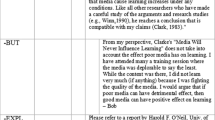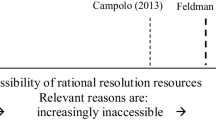Abstract
The present study explored several dispositional factors associated with individual differences in lay adult’s interpretation of when an arguer is, or is not, committed to a statement. College students were presented with several two-person arguments in which the proponent of a thesis conceded a key point in the last turn. Participants were then asked to indicate the extent to which that concession implied a change in the proponent’s attitude toward any of the previous statements in the argument. Participants designated as ‘liberal’ used the concession to infer substantial change in commitment to earlier statements in the argument. A group designated as ‘conservative’ were reluctant to make any such inferences. A discriminant analysis indicated that variables assessing participants’ attitudes toward argument as well as their cognitive and communication styles jointly predicted their liberal or conservative status. The discriminant function and follow-up group comparisons indicated that liberals were more likely than conservatives to engage in argument. This included a greater tendency to use argument as a source of knowledge. Liberals also employed a more sophisticated message design logic than conservatives on a communication task. The groups did not clearly differ with respect to participants’ implicit theory of argument, though trends were present that merit attention in future research. Implications of these findings for future research on lay interpretations of commitment are discussed.
Similar content being viewed by others
References
Bailenson, J. 2001. Contrast ratio: Shifting burden of proof in informal arguments. Discourse Processes 32(1): 29–41.
Bailenson, J.N., and L.J. Rips. 1996. Informal reasoning and burden of proof. Applied Cognitive Psychology 10: S3–S16.
Belenky, M.F., B.M. Clinchy, N.R. Goldberger, and J.M. Tarule. 1997. Women’s ways of knowing: The development of self, voice, and mind, 2nd ed. New York: Basic Books.
Benjamini, Y., and Y. Hochberg. 1995. Controlling the false discovery rate: A practical and powerful approach to multiple testing. Journal of the Royal Statistical Society B 57(1): 289–300.
Chapman, M. 1993. Everyday reasoning and the revision of belief. In Mechanisms of everyday cognition, ed. J.M. Puckett, and H.W. Reese. Hillsdale, NJ: LEA.
Cummings, L. 2005. Pragmatics: A multidisciplinary perspective. Mahwah, NJ: LEA.
Evans, J.St.B.T. 2007. Hypothetical thinking: Dual processes in reasoning and judgement. New York: Psychology Press.
Felton, M.K. 2004. The development of discourse strategies in adolescent argumentation. Cognitive Development 19: 35–52.
Felton, M., and D. Kuhn. 2001. The development of argumentive discourse skill. Discourse Processes 32(2&3): 135–153.
Frank, D.A. 2004. Argumentation studies in the wake of The New Rhetoric. Argumentation and Advocacy 40: 267–283.
Galotti, K.M., B. McVicker-Clinchy, K.H. Ainsworth, B. Lavin, and A.F. Mansfield. 1999. A new way of assessing ways of knowing: The attitudes towards thinking and learning survey (ATTLS). Sex Roles 40(9/10): 745–766.
Gilbert, M.A. 1997. Coalescent argumentation. Mahwah, NJ: Erlbaum.
Gratton, C. 2000. Counterexamples and tacit premises. Inquiry: Critical Thinking Across the Disciplines 20(1): 9–22.
Hamblin, Ch.L. 1970. Fallacies. London: Methuen.
Hamilton, M.A., and P.J. Mineo. 2002. Argumentativeness and its effect on verbal aggressiveness: A meta-analytic review. In Interpersonal communication research: Advances through meta-analysis, ed. M. Allen, R.W. Preiss, B.M. Gayle, and N. Burrell, 281–314. Mahwah, NJ: Erlbaum.
Hample, D. 2005. Arguing: Exchanging reasons face to face. Mahwah, NJ: Erlbaum.
Hample, D., B. Warner, and D. Young. 2009. Framing and editing interpersonal arguments. Argumentation 23: 21–37.
Hintikka, J. 1992. The interrogative model of inquiry as a general theory of communication and cognition. Communication and Cognition 25(2 and 3): 221–241.
Infante, D.A. 1981. Trait argumentativeness as a predictor of communicative behavior in situations requiring argument. Central States Speech Journal 32: 265–272.
Infante, D.A., and A.S. Rancer. 1982. A conceptualization and measure of argumentation. Journal of Personality Assessment 46: 72–80.
Infante, D.A., M.M. Step, and C.I. Horvath. 1997. Counterattitudinal advocacy: When high argumentatives are more persuasible. Communication Research Reports 14: 79–87.
Jacobs, S. 1989. Speech acts and arguments. Argumentation 3: 345–365.
Kazoleas, D. 1993. The impact of argumentativeness on resistance to persuasion. Human Communication Research 20: 118–137.
Klaczynski, P.A., and K.L. Lavallee. 2005. Domain-specific identity, epistemic regulation, and intellectual ability as predictors of belief-biased reasoning: A dual-process perspective. Journal of Experimental Child Psychology 92(1): 1–24.
Krabbe, E.C.W. 1985. Formal systems of dialogue rules. Synthese 63: 295–328.
Kuhn, D. 2005. Education for thinking. Cambridge, MA: Harvard University Press.
Leitao, S. 2000. The potential of argument in knowledge building. Human Development 43: 332–360.
Mackenzie, J.D. 1985. No logic before Friday. Synthese 79: 99–117.
Mackenzie, J.D. 1990. Four dialogue systems. Studia Logica 49: 567–583.
Martin, M.M., C.M. Anderson, and K.S. Thweatt. 1998. Aggressive communication traits and their relationship with the cognitive flexibility scale and the communication flexibility scale. Journal of Social Behavior and Personality 13: 531–540.
O’Keefe, B.J. 1988. The logic of message design: Individual differences in reasoning about communication. Communication Monographs 55: 80–103.
O’Keefe, B.J. 1990. The logic of regulative communication: Understanding the rationality of message designs. In Seeking compliance: The production of interpersonal influence messages, ed. J. Dillard, 87–106. Scottsdale, AZ: Gorusuch-Scarisbrick.
O’Keefe, D.J. 2003. Against familywise alpha adjustment. Human Communication Research 29: 431–447.
Onyekwere, E.O., R.B. Rubin, and D.A. Infante. 1991. Interpersonal perception and communication satisfaction as a function of argumentativeness and ego-involvement. Communication Quarterly 39: 35–47.
Pacini, R., and S. Epstein. 1999. The relation of rational and experiential information processing styles to personality, basic beliefs, and the ratio-bias phenomenon. Journal of Personality and Social Psychology 76(6): 972–987.
Rancer, A.S., and T.A. Avtgis. 2006. Argumentative and aggressive communication: Theory, research, and application. Thousand Oaks CA: Sage.
Rancer, A.S., and D.A. Infante. 1985. Relations between motivation to argue and the argumentativeness of adversaries. Communication Quarterly 33: 209–218.
Rancer, A.S., R.L. Kosberg, and R.A. Baukus. 1992. Beliefs about arguing as predictors of trait argumentativeness: Implications for training in argument and conflict management. Communication Education 41: 375–387.
Rescher, N. 1977. Dialectics: A controversy-oriented approach to the theory of knowledge. Albany: SUNY Press.
Ricco, R.B. 2002. Analyzing the roles of challenge and defense in argumentation. Argumentation and Advocacy 39(1): 1–22.
Rips, L.J. 1998. Reasoning and conversation. Psychological Review 105(3): 411–441.
Rips, L.J., S.K. Brem, and J.N. Bailenson. 1999. Reasoning dialogues. Current Directions in Psychological Science 8(6): 172–177.
Schrodt, P., and L. Wheeless. 2001. Aggressive communication and informational reception apprehension: The influence of listening anxiety and intellectual inflexibility on trait argumentativeness and verbal aggressiveness. Communication Quarterly 49: 53–69.
Searle, J.R. 1969. Speech acts: An essay in the philosophy of language. Cambridge, UK: Cambridge University Press.
Stanovich, K.E., and R.F. West. 1997. Reasoning independently of prior belief and individual differences in actively open-minded thinking. Journal of Educational Psychology 89(2): 342–357.
Tabachnick, B.G., and L.S. Fidell. 2001. Using multivariate statistics, 4th ed. Boston: Allyn and Bacon.
van Eemeren, F.H., and R. Grootendorst. 2004. A systematic theory of argumentation: The pragma-dialectical approach. Cambridge: Cambridge University Press.
van Eemeren, F.H., and P. Houtlosser. 2007. The study of argument as normative pragmatics. Pragmatics and Cognition 15(1): 161–177.
van Eemeren, F.H., R. Grootendorst, F. Snoeck Henkemans, J.A. Blair, R.H. Johnson, E.C. Krabbe, et al. 1996. Fundamentals of argumentation theory. Mahwah, NJ: Erlbaum.
van Eemeren, F.H., R. Grootendorst, and F. Snoeck Henkemans. 2002. Argumentation: Analysis, evaluation, presentation. Mahwah, NJ: LEA.
Walton, D.N. 1987. Informal fallacies: Towards a theory of argument criticisms. Amsterdam: John Benjamins.
Walton, D.N. 1989. Dialogue theory for critical thinking. Argumentation 3: 169–184.
Walton, D.N. 1996. Argumentation schemes for presumptive reasoning. Mahwah, NJ: Erlbaum.
Walton, D.N. 2000. The place of dialogue theory in logic, computer science, and communication studies. Synthese 123: 327–346.
Walton, D.N., and E.C. Krabbe. 1995. Commitment in dialogue. Albany: SUNY Press.
Williams, V.S.L., L.V. Jones, and J.W. Tukey. 1999. Controlling error in multiple comparisons, with examples from state-to-state differences in educational achievement. Journal of Educational and Behavioral Statistics 24(1): 42–69.
Author information
Authors and Affiliations
Corresponding author
Appendix
Appendix
Turn | Arguer | Statement |
|---|---|---|
Pro-death-penalty argument | ||
1. | Bob | The death penalty should be adopted by all states |
2. | Ed | Why do you say that? |
3. | Bob | It’s punishment that fits the crime—a life for a life |
4. | Ed | No. It’s punishment that is no better than the crime. Killing is wrong whether its by a criminal or the State |
5. | Bob | You can’t compare execution of a violent criminal in the name of justice with the murder of innocent life |
6. | Ed | Yes, you can. If its wrong to kill, then it doesn’t matter what the circumstance is |
7. | Bob | Okay, you’re right about that |
Con-death-penalty argument | ||
1. | Bob | The death penalty should be banned in California and other states |
2. | Ed | Why do you say that? |
3. | Bob | It’s a cruel and unusual form of punishment |
4. | Ed | It’s not cruel. It’s punishment that fits the crime—a life for a life |
5. | Bob | No. It’s punishment that is no better than the crime. Killing is wrong whether its by a criminal or the State |
6. | Ed | You can’t compare execution of a violent criminal in the name of justice with the murder of innocent life |
7. | Bob | Okay, you’re right about that |
Rights and permissions
About this article
Cite this article
Ricco, R.B., Sierra, A.N. Individual Differences in the Interpretation of Commitment in Argumentation. Argumentation 25, 37–61 (2011). https://doi.org/10.1007/s10503-010-9191-6
Published:
Issue Date:
DOI: https://doi.org/10.1007/s10503-010-9191-6




